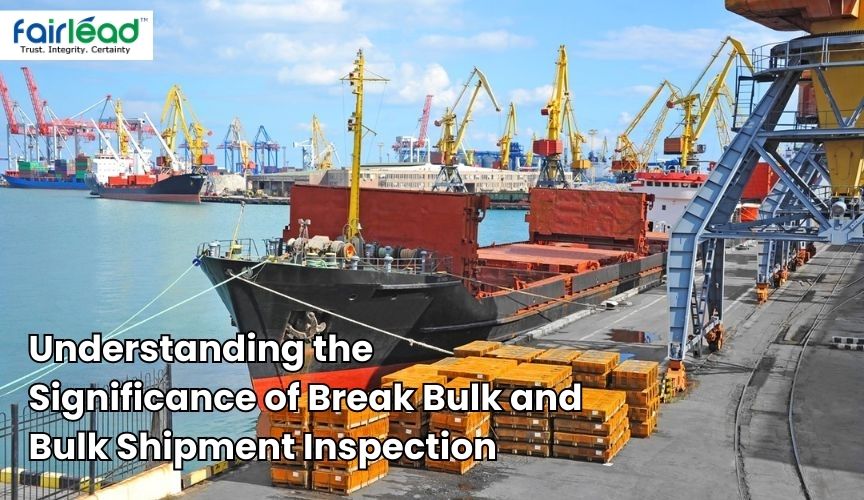In the realm of worldwide exchange, the transportation of products is a perplexing and basic cycle. Among the various techniques used for transportation, breakbulk and mass shipments play critical roles. Extensive inspection procedures are necessary to guarantee the safe and effective transportation of goods.
In this blog, we will dig into the intricate details of break endlessly mass shipment assessment. We also investigate its significance, the industries it affects, and the manner in which this procedure ensures the smooth delivery of goods worldwide.
The Importance of Break Bulk and Bulk Shipment
Inspection In the logistics industry, break bulk and bulk shipment inspection are two essential procedures. These examinations include looking at freight for consistency with security principles, weight guidelines, and appropriate bundling. We should explore the fundamental role they play in the transportation of goods.
Keeping cargo safe during transportation, break bulk and bulk shipment inspection is of the utmost importance. Breakbulk and mass shipments often involve large, heavy, or hazardous items. Proper inspection ensures that the freight is securely handled, preventing any mishaps during transportation.
Respecting regulations different regulatory bodies establish guidelines for cargo transportation. Inspection of breakbulk and bulk shipments ensures compliance with all essential regulations, avoiding legal issues and delays.
Inspection's Crucial Role in Safe Mass Shipments Across Industries
1. Oil and Gas Industry
The oil and gas industry depends intensely on mass shipments to move petrol, melted flammable gas (LNG), and other energy assets. Examination guarantees the protected dealing and transportation of these significant items.
2. Farming and Food Area
Mass shipment assumes an essential part in moving rural items, like grains, cereals, and eatable oils. During transportation, inspection ensures the quality and safety of food products.
3. Heavy Machinery and Construction
The transportation of heavy machinery, steel, and other construction materials is dependent on break bulk shipments in the construction industry. During transportation, an inspection ensures that these materials are intact.
4. Automobiles And Automotive Parts
Breakbulk and bulk shipments are commonly used in the automotive industry to transport automobiles and automotive parts. The inspection ensures that vehicles are properly packed and safeguarded during transportation.
5. Mining and Minerals
In the mining and minerals industry, bulk shipments of minerals and ores are commonly employed for transportation. Inspection minimizes the chance of damage and ensures that the container can hold heavy-duty materials.
6. Synthetic Compounds & Drugs
Mass shipments transport different synthetic compounds and drug items. Inspection ensures the safe handling of hazardous substances and compliance with regulations.
7. Renewable Energy Materials
The transportation of substantial components like solar panels and wind turbine blades necessitates bulk shipments in the renewable energy industry. Investigation ensures the trustworthiness of these basic parts.
The Process of Break Bulk and Bulk Shipment Inspection
Step-1: Pre-Assessment Arranging
Before inspection begins, an itemized plan is made. This includes determining the scope, identifying inspection points, and ensuring the availability of all necessary personnel and equipment.
Step-2: Visual Examination
A visual assessment of the freight is conducted to identify any visible damage, improper packaging, or signs of mishandling. Monitors search for potential dangers that could influence the freight during transportation.
Step-3: Weight and Estimation Check
Weight and estimation confirmation are fundamental for guaranteeing consistency with guidelines and weight circulation for safe transportation.
Step-4: Verification of Documents
All necessary documents, such as packing lists and customs declarations, are examined to guarantee their completeness and accuracy.
Step-5: Security Checks
The shipment inspectors may conduct security checks to identify any potential hazards or unauthorized items.
Step-6: Sampling and Testing
In some instances, cargo may be subjected to sampling and testing in order to ascertain whether or not it complies with particular standards.
Step-7: Final Inspection Report
Following the inspection, a comprehensive report is prepared outlining the findings and any actions required for safety and compliance.
Comprehensive Cargo Inspections at Every Stag
Inspection before loading: Cargo inspectors check the goods' condition and packaging before they are loaded to make sure they meet the standards.
Stacking and Getting Investigation: Reviewers screen the stacking system to ensure that the merchandise is fittingly stashed and gotten to forestall moving during travel.
Inspection in Transit: Periodic inspections of the cargo may be carried out during transportation to evaluate its condition and promptly address any issues that may arise.
Inspection of the Unloading and Discharge: Upon appearance, the freight is investigated again to guarantee that it was not harmed during travel and is prepared for conveyance.
How Advanced Technologies Improve Efficiency & Accuracy Of Cargo Inspection?
Non-Destructive Testing (NDT): NDT techniques permit auditors to evaluate freight deeply without causing harm.
X-beam and Imaging Advancements: X-beam and imaging devices empower overseers to see inside compartments and distinguish expected issues.
Web of Things (IoT): IoT gadgets can give continuous information on freight conditions during travel, working with proactive mediation.
Break Bulk and Bulk Shipment Inspection's Future Trends
The world of cargo inspection is changing, and the future is being shaped by several exciting trends:
Mechanization and Mechanical technology: Robotization is smoothing out review processes, expanding effectiveness, and decreasing human mistakes.
Man-made reasoning in Assessment: Simulated intelligence-controlled apparatuses can dissect tremendous measures of information and recognize designs for better navigation.
Maintainability and Green Examinations: The business is moving towards eco-accommodating examination practices to decrease natural effects.
Conclusion
As we have seen in this blog, breakbulk and bulk shipment inspections play a crucial role in transportation and logistics. From ensuring freight safety to adhering to regulations and facilitating smoother customs clearance, this process plays a crucial role in various industries. Businesses can enhance their shipping practices, reduce risks, and optimize their supply chains by comprehending the inspection procedure and its impact on various industries. Contact us for the best break bulk and bulk shipment inspection need.



